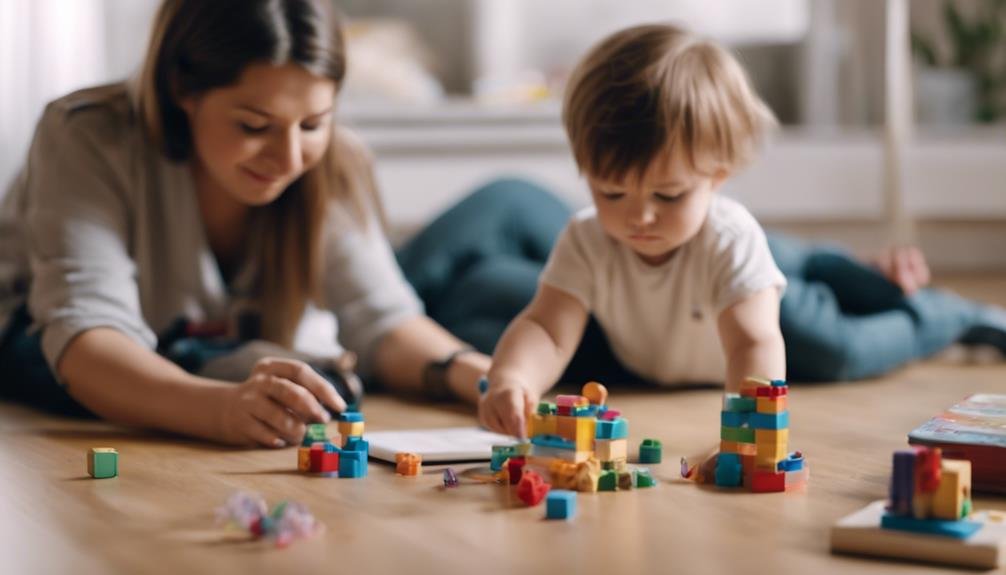How Technology Affects Toddler Development: Insights From Experts
As you navigate the world of toddler development in the digital age, ponder this: how does technology truly shape the minds of our youngest learners? Understanding the nuanced effects, both positive and negative, can provide valuable insights into crafting a balanced approach. Experts weigh in on the intricate relationship between toddlers and technology, shedding light on key considerations that may reshape your perspective on early childhood interactions with screens.
Key Takeaways
- Interactive technology can enhance problem-solving skills and spatial reasoning in toddlers.
- Excessive screen time may lead to attention issues and decreased cognitive abilities.
- Prolonged exposure to screens can hinder the acquisition of crucial social cues.
- Increased screen time is associated with a higher risk of obesity and less active play.
- Monitoring and limiting screen time is crucial for healthy emotional development in toddlers.
Impact of Technology on Cognitive Development

The use of technology in early childhood has been shown to have both positive and negative effects on cognitive development in toddlers. While interactive educational apps and games can enhance problem-solving skills and spatial reasoning, excessive screen time may lead to attention issues and decreased cognitive abilities. Research indicates that moderate use of technology, under parental supervision, can support cognitive development by exposing toddlers to educational content and promoting critical thinking. However, overreliance on screens at a young age has been linked to delays in language development and reduced attention spans.
Studies suggest that interactive technology, when used in moderation, can provide cognitive benefits such as improved memory and enhanced visual-spatial skills. It's crucial for parents to balance screen time with hands-on activities and face-to-face interactions to foster well-rounded cognitive development in toddlers. By incorporating technology mindfully into a child's routine, caregivers can harness its potential benefits while mitigating any potential negative impacts on cognitive growth.
Influence on Social Skills and Communication
Excessive screen time during early childhood can impact the development of social skills and communication abilities in toddlers. Research suggests that prolonged exposure to screens may hinder the acquisition of crucial social cues and the development of effective communication skills. Toddlers who spend excessive time in front of screens may struggle with interpreting facial expressions, body language, and vocal tones, which are essential components of social interactions. This lack of exposure to real-world social situations can lead to difficulties in establishing and maintaining relationships with peers and adults.
Furthermore, the overuse of technology can limit opportunities for toddlers to engage in face-to-face communication, such as conversations with family members or interactive play with friends. These interactions are vital for honing language skills, learning turn-taking, and practicing empathy – all of which are foundational aspects of healthy social development. Therefore, it's crucial for caregivers to monitor screen time and ensure that toddlers have ample opportunities for real-world social interactions to support their social skills and communication abilities.
Effects on Physical Health and Activity

Screen time in toddlers has been linked to various negative impacts on physical health and activity levels. Research suggests that increased screen time is associated with a higher risk of obesity in toddlers due to reduced physical activity. Toddlers who spend more time in front of screens are likely to engage in less active play, leading to a sedentary lifestyle that can have long-term health consequences. Moreover, excessive screen time can disrupt sleep patterns in toddlers, affecting their overall well-being and physical development.
Studies have also shown that prolonged screen exposure in toddlers may lead to musculoskeletal issues, such as neck and back pain, due to poor posture while using devices. Additionally, excessive screen time can contribute to vision problems in young children. To promote better physical health and activity levels in toddlers, experts recommend limiting screen time, encouraging outdoor play, and incorporating physical activities into daily routines. Prioritizing active play and reducing screen time can help toddlers maintain a healthy lifestyle and support their physical development.
Relationship Between Tech Use and Language Development
Studies indicate a correlation between technology use and language development in toddlers. Research suggests that excessive screen time may impact language acquisition in early childhood. Toddlers exposed to high levels of screen media tend to have delayed language skills compared to those with limited screen exposure. The American Academy of Pediatrics recommends interactive, high-quality programming for children aged 18 to 24 months to support language development. However, passive screen time, such as watching videos without interaction, may hinder language learning.
Furthermore, the type of content matters. Educational apps or programs designed to enhance language skills can be beneficial when used moderately and accompanied by adult interaction. On the other hand, exposure to background television noise or fast-paced, flashy content could impede language development in toddlers. Thus, it's crucial for caregivers to monitor the quality and quantity of screen time their toddlers engage in to promote healthy language development.
Emotional Regulation and Screen Time

The impact of screen time on emotional regulation in toddlers is a critical aspect to consider in understanding the broader effects of technology on early childhood development. Research suggests that excessive screen time can lead to difficulties in emotional regulation for toddlers. When toddlers spend extended periods in front of screens, they may struggle to manage their emotions effectively. This can manifest in behaviors such as increased irritability, impulsivity, and difficulty in calming down after experiencing strong emotions.
Studies have shown that screen time can disrupt the development of self-regulation skills in toddlers, which are crucial for managing emotions and behaviors. Excessive screen use has been linked to an increased risk of emotional dysregulation and behavioral problems in young children. As a parent or caregiver, it's important to monitor and limit the amount of screen time your toddler has to support healthy emotional development.
Importance of Parental Involvement and Monitoring
Parental involvement and monitoring play a pivotal role in shaping a toddler's interactions with technology and subsequent developmental outcomes. When it comes to your child's tech usage, your active participation can make a significant difference. Here are four key reasons why your involvement matters:
- Setting Boundaries: Your guidance helps establish limits on screen time and the types of content your toddler engages with, fostering a healthy balance.
- Modeling Behavior: By demonstrating responsible tech use yourself, you provide a positive example for your child to follow.
- Encouraging Interaction: Your participation in your toddler's tech activities can enhance their learning experience and strengthen your bond.
- Monitoring Content: Keeping an eye on the apps and games your child uses allows you to ensure they're age-appropriate and align with your family values.
Strategies for Balancing Tech Exposure

To promote healthy development in toddlers, it's crucial to implement effective strategies for managing their exposure to technology. Research suggests that setting clear boundaries is essential. Establishing specific time limits for tech use and designating tech-free zones in the home can help create a balanced environment.
Additionally, being a positive role model by limiting your own screen time can influence your toddler's behavior positively. Engaging in interactive activities such as reading together, outdoor play, and creative arts can offer alternative ways for your child to learn and grow.
Moreover, actively choosing high-quality educational content and apps can make a significant difference. Selecting age-appropriate, interactive, and educational materials can enhance your toddler's learning experience while using technology. Monitoring and participating in your child's tech activities can provide opportunities for bonding and ensure their safety online.
Frequently Asked Questions
Can Technology Use in Toddlers Lead to Long-Term Learning Disabilities?
Using technology excessively at a young age can potentially lead to long-term learning disabilities in toddlers. Experts warn that prolonged screen time may hinder cognitive development and social skills, impacting their overall learning abilities.
How Does Excessive Screen Time Affect a Toddler's Sleep Patterns?
Imagine excessive screen time as a thief stealing your toddler's peaceful slumber. Research shows that it disrupts sleep patterns, leading to difficulties falling asleep and poorer quality sleep. Limit screen exposure before bedtime for better rest.
Is There a Correlation Between Early Tech Exposure and Attention Span?
Exposure to technology at a young age can impact attention span. Research suggests that early tech use may correlate with shorter attention spans in toddlers. It's crucial to monitor and limit screen time for healthy cognitive development.
Can Technology Hinder a Toddler's Ability to Form Real-Life Friendships?
Imagine technology as a double-edged sword in your toddler's social world. Excessive screen time can hinder real-life friendship formation by limiting face-to-face interactions crucial for emotional development. Balance is key for healthy relationships.
What Are the Risks of Over-Reliance on Tech for Emotional Regulation in Toddlers?
When relying too much on tech for emotional regulation, toddlers may struggle to develop natural coping mechanisms. This overdependence can hinder emotional growth and interpersonal skills, potentially leading to difficulties in managing emotions independently.
Conclusion
In conclusion, experts emphasize the importance of balancing technology use in toddlers to support cognitive development while mitigating potential negative impacts.
Research shows that children aged 2-5 spend an average of 2 hours per day on screens, which can affect their social skills and language development.
By actively monitoring and limiting screen time, parents can help their toddlers thrive both cognitively and socially in today's digital age.






